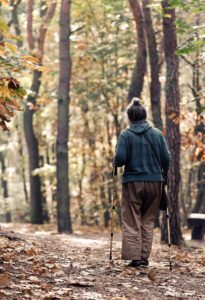The Lowdown on Loneliness

Author: Ruth Preston
“It has been so long since I saw anyone I knew in the flesh. Seeing her face has literally made my year! I almost cried.”

(‘Time to Talk Befriending’ scheme member aged 91)
We hear a lot about the issue of loneliness in our society. Experiencing chronic loneliness can occur at any age. The risk of loneliness is not driven by age but by people’s circumstances which can differ depending on their age. The death of a loved one, and the onset of illness and disability are more often times of vulnerability for older people.
So, what is loneliness, why do we need to do something about it and what can we do?
What is loneliness?
There is no agreed definition of ‘loneliness’ but one explanation is that it is a painful feeling that occurs when there is a gap, or a mismatch, between the number and quality of social relationships and connections that we have, and those we would like. Others suggest that there are two dimensions to loneliness: social and emotional. Social loneliness occurs when someone is missing a wider social network and emotional loneliness is caused when you miss an “intimate relationship”. On the whole, loneliness is described as an unwelcome, painful and unpleasant feeling.
Impact of Loneliness
- Loneliness is one of the greatest public health challenges of our time. Three quarters of GPs surveyed say they see 1 to 5 people a day who are suffering from loneliness.
- Loneliness has been linked to conditions such as heart disease, strokes and Alzheimer’s.
- Loneliness and social isolation are harmful to our health: research shows that lacking social connections is as damaging to our health as smoking 15 cigarettes a day (Holt-Lunstad, 2015).
- Loneliness and low social interaction are predictive of suicide in older age (O’Connell et al, 2004)
- 200,000 older people haven’t had a conversation with a friend or relative in the past month.
- The number of over 50s suffering from loneliness is set to reach 2 million by 2025/6. This amounts to a 49% increase in 10 years.
What is being done to combat loneliness?
Loneliness has such a detrimental impact on so many people’s lives that it has become a topic of national importance. In 2018 the Government launched its strategy to tackle the issue and national campaigns (Age UK ‘No-one should have no-one’ and The Campaign to End Loneliness) has helped to raise awareness.
Traditionally, initiatives to tackle loneliness have been focused on practical ways to bring people together such as clubs, group activities, and outings. These have made a difference to numerous lives and a more recent innovation of linking people of different generations together has become very popular.

Many lonely older people also have mobility issues so they are unable to get out to clubs or activities or meet other people; the danger is that they become hidden and forgotten members of our communities. To prevent this from happening a growing number of local befriending charities have sprung up in the UK. They match volunteers with lonely, vulnerable older people for regular visits or phone calls and, where possible, outings. A range of other services are also offered: group peer befriending, signposting, special events at Christmas and prayer and pastoral support from a chaplaincy team.
What can I do?
- Some older people view loneliness as a normal part of ageing that needs to be accepted. Others wouldn’t ask for help and would try to support themselves. These attitudes and the stigma that often surrounds loneliness can be a barrier to older people receiving support that could improve the quality of their lives. Everyone who comes into contact with an older person either in a professional capacity or as a member of their Church or community can play a part in preventing loneliness by getting to know them, listening, and being aware.
- Keep an eye out for those in your church and local community who you know are living alone, who may have experienced a life-changing event such as a bereavement, or who are on their own at Church and might be lonely. Get to know them, listen to them, introduce them to people you know, invite them along to Church groups and events and go with them.
- Consider befriending an older person by volunteering with a local befriending charity. A phone call or a visit once a week can make a world of difference to an older person and to you! For example, Time to Talk Befriending is an award-winning charity operating in Brighton & Hove, Worthing and Adur, receives positive feedback from volunteers and scheme members alike:
Volunteer Jo: “I’ve had such a positive experience – I can honestly say it’s been so impactful and enriching to my life! Simply taking the time to have a cuppa and chat about everything from house plants to politics to travel has been wonderful – sharing life lessons from someone in an older generation is so valuable. And I feel like I’ve been on hand to help when she’s needed it too.”
Scheme member aged 90: “All my family have gone and my friends have passed away. I have felt like an orphan for so long… I can’t tell you the difference it’s made.”
To find a befriending charity in your area check out the Befriending Networks website: www.befriending.co.uk
What does God say?
 We are never alone; God is with us ‘I look behind me and you’re there, then up ahead and you’re there too – your reassuring presence, coming and going.’ (Psalm 139 v 5 & 6 The Message). We are also a family of believers where no-one should feel lonely ‘God sets the lonely in families.’ (Psalm 68 verse 6 The NIV). As God has sought each one of us out (Luke Ch. 19 v 10) let us then lookout for those who are lonely and welcome them in.
We are never alone; God is with us ‘I look behind me and you’re there, then up ahead and you’re there too – your reassuring presence, coming and going.’ (Psalm 139 v 5 & 6 The Message). We are also a family of believers where no-one should feel lonely ‘God sets the lonely in families.’ (Psalm 68 verse 6 The NIV). As God has sought each one of us out (Luke Ch. 19 v 10) let us then lookout for those who are lonely and welcome them in.
For further information and resources on loneliness, visit our resource hub.
Claire Godley is a trustee for befriending charity Time to Talk Befriending (www.tttb.org.uk) and works for Age UK West Sussex, Brighton & Hove.
